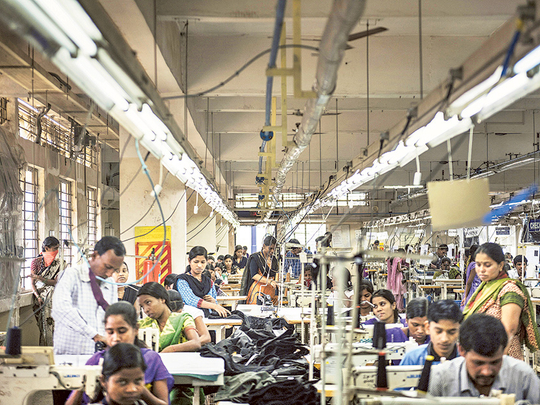
Bengaluru, India: The factory floor is going full throttle when the new girls walk in. Everywhere is the thrumming of sewing machines, the hum of fans, the faint burning smell of steam irons. On narrow tables that run between the machines, half-assembled Marks & Spencer miniskirts are thrust forward by fistfuls. The tailors, absorbed in the task of finishing 100 pieces per hour, for once turn their heads to look.
The new girls smell of the village. They have sprinklings of pimples. They woke well before dawn to prepare themselves for their first day of work, leaning over one another’s faces in silence to shape the edges of each eyebrow with a razor blade.
The tailors glance up for only a moment, long enough to take in an experiment. The new workers — teenagers, most of them — have been recruited from remote villages to help factories like this one meet the global demand for cheap garments. But there is also social engineering going on.
A government programme has drawn the trainees from the vast population of rural Indian women who spend their lives doing chores. In 2012, the last time the government surveyed its citizens about their occupation, an astonishing 205 million women between the ages of 15 and 60 responded “attending to domestic duties.”
Bengaluru is the first city the 37 trainee tailors have seen. They are dazzled by the different kinds of light. Picking their way through the alleys around the factory, they stare up at an apartment building that towers over the neighbourhood and wish their mothers could see it.
Among them are two sisters, Prabhati and Shashi Das. They have come from a village at the end of a road, a place so conservative that the single time they went to a movie theatre, their male cousins and uncles created a human chain around them, their big hands linked, to protect them from any contact with outside men. They are, as far as they know, the first unmarried women who have ever migrated from the village to work.
Still, they go. Prabhati, at 21, is stubborn and able, and Shashi, two years her junior, pretty and fizzing with suppressed laughter.
It is late May, the first day of their factory summer — of love letters folded into squares and dropped onto work stations; of fevers sweated out on the floor of a bare hostel room; of supervisors shouting in a language they do not understand, a couple of words — “work” and “faster” — gradually becoming clear; of capitalism, of men and of a bit of freedom.
It all started in March, in the drippy jungle of rural Odisha, when two distant relatives happened to meet on the roadside.
One of the men had found employment as a “mobiliser” for Gram Tarang, a for-profit agency contracted by India’s government to recruit and train workers. He mentioned that Gram Tarang was offering a cash incentive — roughly Rs450 (Dh24), or about $6.75, a head — to mobilisers who identified young women willing to enrol in a training programme for garment factory jobs.
The second man, Hemant Das, perked up, sensing the approach of a change of career.
Hemant was from a village called Ishwarpur, and as it happened, idle young women were something Ishwarpur had in great quantity. That they could be monetised came as good news.
On its economic merits alone, Hemant figured, the government scheme would prove tempting: After two months of training, their daughters would be placed in a factory in the industrial center of Bengaluru, where they would earn the legal minimum wage, Rs7,187 per month, or about $108, which is more than most of their fathers make. Six months after arriving in Bengaluru, they would be free to return home if they wished.
Luring idle women
Hemant set out the next day with a fistful of pamphlets and an uncharacteristically sunny disposition. But as he made his rounds of local families — 30 of them, at least — they shook their heads. No.
Hemant would have been completely out of luck if he had not thought to try Karuna Das, who had two daughters of marriageable age — Prabhati and Shashi.
Karuna was a sinewy day labourer, and he had roamed far from the village in his younger days to work in iron foundries in Chennai and Hyderabad. The gossip was that Karuna agreed to enrol his eldest daughters because he was unable to scrape together Rs100,000 for dowries. That was undoubtedly the case.
When word spread that he had agreed to send Prabhati and Shashi, the village elders convened emergency meetings to determine whether this violated “purdah,” or separation between the sexes, and whether this would damage the marriage prospects of their own daughters. Women stopped by to tease the girl’s mother, Radha Rani, who wept inconsolably.
It turned out that Karuna had not been asking for permission. He instructed his daughters to pack four or five changes of clothes. Go see what the world is like, he told them.
“They were reluctant to go anywhere because they were a bit scared,” he said. “I told them being scared is OK. OK, you’re scared. Now you have to move on.”
Prabhati has never seen a train, much less ridden in one. When they reach south India, rain begins to hit the window in fat spatters.
Working on an assembly line was not sister Shashi’s idea of fun. But Prabhati plunged forward, and, as usual, Shashi cruised along in her wake.
The sisters, lugging a bag of clothes, sit with 35 other girls from Odisha who are making the same journey.
They have all dressed in baggy purple-and-grey uniforms, with ID cards swinging from their necks. Their parents had made last-minute attempts to keep them from leaving, which had to be repelled with sustained tantrums. A girl called Baby, who is 18 and bespectacled, said that she had secured her mother’s permission only by refusing to eat for two days.
“They wanted me to come home,” she says. “I’m not going home.”
The sun has not yet risen when they arrive at the hostel that will be their new home for the next six months: 137 women in 15 unfurnished rooms, every inch covered with girlish flotsam, lingerie drying on the window grates, sentimental verses pencilled on the walls.
Prabhati and Shashi’s room is being painted, so on the first night 25 of them crowd into two rooms, so tight that one of their roommates stretches out on the kitchen counter.
“I thought there would be beds,” murmurs one, and the chaperone from Gram Tarang looks exasperated.
“They complain, ‘You could have given us this, you could have given us that,’” he says. “We sweetly explain that it is not possible. They don’t have the bed system in Bengaluru.”
But the girls are too keyed up to sleep. Climbing onto the roof, they can see the sun rising over a landscape of other roofs. For the first few weeks, everything is new.
At the K. Mohan & Co. Exports Private Ltd., the girls have entered a world of machines: massive industrial extractors, laser cutters, a rapid-response protocol that kicks in when a needle tip breaks off.
And yet, incredibly, garments worn in the West are still made by humans — nearly all of them women, working exhausting hours, with few legal protections and little chance of advancement, for some of the lowest wages in the global supply chain.
As the trainees practice sewing straight lines on pieces of scrap fabric, supervisors pace the aisle, hoping to spot one with machine-like dexterity and speed. One of them slows, and then stops, beside a girl called Cuddles, the daughter of a truck driver. The supervisor blinks, looks again. This is — there is no other word for it — talent. She has covered the fabric with seams as straight as the lines on ruled notebook paper.
First to be integrated
Cuddles is among the first in the group to be integrated into an assembly line, bent over, eyes straining. Her task is to stitch together three small tags for the Marks & Spencer stretch corduroy skirt: one that identifies the brand, one that gives washing instructions and one the size, a scrap so tiny that it is nearly impossible to hold straight between finger and thumb. If she allows a tag to slip to the floor, or fly away in the gusts from the ceiling fan, her salary will be docked. She will be under pressure to complete this task 100 times per hour for eight hours, with one half-hour break for lunch, for a base daily wage of around $2 (Dh7.35).
A man with a loft of dyed black hair steps out of his office to greet the group. This is N. Manjunath, the assistant general manager for human resources at the factory. He is recruiting rural workers through the government programme because he is desperate: City-dwellers are no longer interested in factory jobs like these, with their low pay and punishing conditions, and attrition rates are high. Migrant women are more docile. This is what Manjunath is hoping.
Prabhati, Shashi and the other recruits take seats in a canteen, and sit with their hands folded in their laps. They are to work every day but Sunday. They can collect their pension in 40 years. Should they die on the job, state health insurance will cover funeral costs.
They are drowsy. The numbers fly by them in flocks. When a response is expected, they chorus “Yes, miss,” or “Yes, sir,” as they would to a schoolmaster.
Manjunath thinks of himself as a kind man. But the complications of employing village girls have strained his last nerve: the weepy petitions for leave to return to the village for essential functions, like a father having a haemorrhoid removed; the domestic squabbles, which on one occasion ended in the consumption of toilet cleaner; and the “love cases,” in which a tailor, upon forming a romantic attachment in the factory, is summarily ordered home.
Lately, when the girls come to him with complaints, he listens sceptically, with a sardonic smile. He assesses this latest batch of recruits, the second from Odisha, as “lackadaisical.” He believes they have come here for an adventure, and will gravitate back to the village as soon as their parents tell them to come home.
He is right to worry. After six months on the job, when the government incentives are paid out, around half the trainees brought in by Gram Tarang return to their villages. Only 40 per cent stay longer than a year.
Within two weeks of their arrival, one of the sisters’ roommates has eloped straight from the factory gates, not even stopping by the hostel to pick up her clothes. Those who remain spill their secrets to one another. Tanushree Behera sleeps entangled with a girl she calls her wife. Jayasmita Behera is divorced, having left her husband less than two weeks after the wedding.
The rest spend their evenings in quiet conversation with boyfriends, whose existence is unknown to their parents.
At the factory, they stitch their boyfriends’ names on scrap fabric. Male tailors stroll by as they work, dropping love letters folded into fat wads, and the girls read them aloud, to comic effect, at the hostel. “My dear, my lever,” someone writes to Shashi in broken English. “I have tied you up in my heart.”
Sitting cross-legged on the floor, they compare notes on evasive manoeuvres they use to avoid being shown to prospective in-laws. Shradhanjali Mallick, the beauty among them, says she used to have success with bouts of hysterical crying, but that moving to Bengaluru has been more effective.
“How can they marry me off if I am not physically present?” she asks innocently, and Prabhati laughs. “Let them hold a wedding of mothers-in-law and fathers-in-law,” she says. “Because that’s the only kind of wedding they will be able to pull off.”
By the first week of June, the new girls are praying for Sunday to arrive. Their joints hurt. Their backs hurt. They come home from the factory with fingers punctured by needles or sliced by industrial clippers. Sitting still for eight hours is strange and new, and at times, the boredom is maddening.
Locked in
They are locked into the hostel except for “out passes” on alternate Sundays, which are granted by the factory human resources staff. A Gram Tarang “life skills” instructor makes the rounds inside the hostel, selling them Rs600 jars of an Herbalife energy drink, which she tells them will help them keep up with the pace of work in the factory. It does give them energy — it includes caffeine and maltodextrin — but it also gives them diarrhoea and eats up their remaining cash. This is no small problem, because they are running out of money for food.
They count the days until June 10, when they will be paid for their first two weeks of work. Prabhati and Shashi, who had left home with Rs5,000, or about $75, find themselves with Rs100 between them. “If there’s no salary today, it’s going to be a problem,” Prabhati says. On June 10, they are not paid. Three more days pass, and they still are not paid.
About 15 girls walk into Manjunath’s office, hearts pounding, to demand their pay. The girls are promised an advance for rice and are ordered to leave his office. .
The money for the first two weeks’ work comes through three or four days later — after withholdings for pension, health insurance, lodging, food and kitchen furnishings, a grand total of Rs1,874, or roughly $28. This sum must last them for the next month. In the hostel room where Prabhati and Shashi stay, the amount of the paycheque is not relevant. They have never earned money before, only asked their fathers for it. A wave of happiness washes over all of them. They do not feel like girls, they say: They feel like boys.
They transfer credit — Rs30, Rs50 — to the cell phones of their mothers, brothers, sisters-in-law, brothers-in-law and boyfriends, as if they were distributing sweets to celebrate some windfall.
Unable to wait, they call their families from cubbyhole ATMs to share the news.
Prabhati and Shashi make a pact: They will stay in Bengaluru at least a year. They spend much of their paycheques on nose rings for each other, tiny specks of 22-carat gold.
It is strange that one of the first girls to falter is Prabhati, who was the most resolute about staying in Bengaluru.
She has contracted a fever that comes and goes for two weeks.
It is Shashi who tells their father that her sister is sick. Her father calls the Gram Tarang training centre, demanding that Prabhati be sent home.
It turns out factory life agrees with Shashi. She has been absorbed into an assembly line expected to produce 100 pairs of khaki chinos an hour.
Shashi finds it interesting that she, the black sheep in the family, is the one becoming a city person. Shashi arranges for a meeting with Sunil, a boy from a neighbouring village whom she wants to marry. Now that her sister is gone, it is no longer necessary for Shashi to keep this a secret.
Back in Bengaluru, the factory girls’ fathers have begun to call. They expect them to come home on leave in December, after the six-month factory stint is up. Jayasmita’s father says a marriage proposal has come from a man in Cattuck.
No marriage talk
“I tell them I’m not going anywhere,” she says. “The moment I heard talk about marriage, I hung up.”
Shradhanjali says she will return, and plans to wriggle out of yet another proposal. “If possible, I’ll fight it off,” she says, but sounds uncertain.
The factory girls seem less afraid every month.
Shashi sees her boyfriend, Sunil, as planned. He takes the overnight train in from Kerala, where he has migrated for work.
Her smartphone has become an appendage. She presses it to her ear while she is walking down the lane, striding over rats flattened into the pavement. Waking in the night, she rolls over and checks it for new messages. A group of her friends are toying with the idea of leaving the hostel, seeking higher-paid work at another factory.
She is amazed at how far she has come.
On an outing last Sunday, she arranged to meet a male cousin.
That’s another thing: Shashi and her friends are not the new girls anymore. The new girls are arriving from Uttar Pradesh and Jharkhand. Dropping their bags in their rooms, they climb up to the roof to gaze at the 22-storey building, which is the most amazing thing they have ever seen.
Their eyes widen at the girls from Odisha, in their jeans and T-shirts. The girls from Odisha regard them with friendly condescension. They invite them into their rooms, as if they’ve been here forever.












